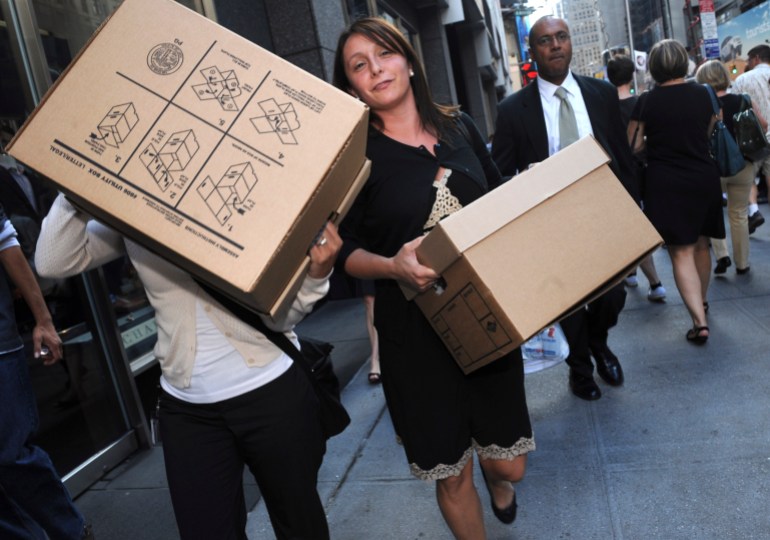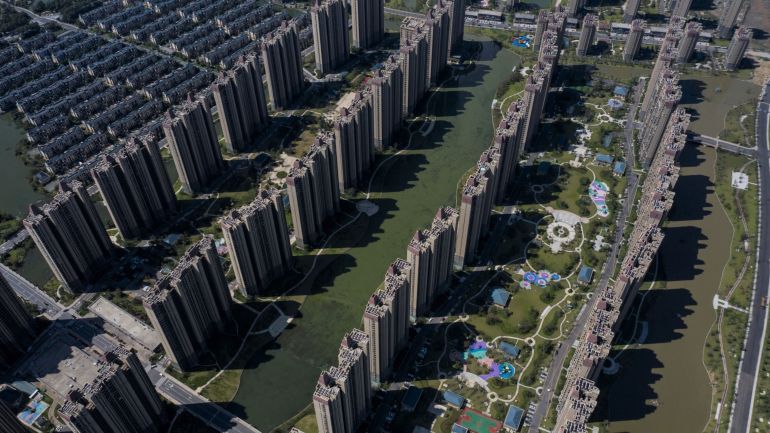The images of hundreds of employees with boxes in their hands marching out of the New York City headquarters of Lehman Brothers after the company declared bankruptcy on September 15, 2008 became one of the enduring images of the global financial crisis, a visual shorthand for how an industry-leading firm can come to ruin and pull a nation — and the world — down with it.
Now, the images of disgruntled China Evergrande Group investors, employees and vendors camped outside the firm’s headquarters in Shenzhen in recent weeks have the potential to become a shorthand of their own.
The real estate firm is in serious trouble. On Monday, it failed to make interest payments to at least two of its largest bank creditors, Bloomberg News reported, and it looks like it will also miss paying about $83.5m in dollar-bond interest due on Thursday.
 People sit outside of Evergrande’s headquarters in Shenzhen, China, demanding repayment of loans and financial products, one of a series of protests at the Chinese firm’s offices [File: David Kirton/Reuters]
People sit outside of Evergrande’s headquarters in Shenzhen, China, demanding repayment of loans and financial products, one of a series of protests at the Chinese firm’s offices [File: David Kirton/Reuters]Investors are worried an Evergrande debt default could send shock waves through the Chinese and global economies, much as Lehman Brothers did to the United States and the world in 2008.
But China in 2021 isn’t the US in 2008, and what’s less clear is to what lengths the Chinese government is willing to go to stave off the social and financial upheaval a messy Evergrande collapse could cause.
So will Evergrande prove to be China’s Lehman Brothers moment, or is the firm too big to fail in President Xi Jinping’s China? Here’s what you need to know.
Recap. What sort of firm is Evergrande?
Evergrande currently holds the dubious title of the world’s most indebted real estate developer. Founded in 1996 by Hui Ka Yan, it has grown into one of the biggest firms in China and has in the process made Hui the 53rd richest person on Forbes’s Billionaires 2021 list and the 10th wealthiest on its China Rich List 2020.
The company currently has 1,300 real estate projects in 280 cities in China, according to its website, and is also involved in electric vehicle production, property management, film and TV production, theme park construction, life insurance, healthcare, football and food and baby products.
So how badly in debt is Evergrande?
The company has $300bn in liabilities and its leadership has made it clear it doesn’t have the means to pay its various creditors on time.
That has investors inside and outside of China majorly worried, including about a potential contagion effect.
What is that?
Simply put, it’s the fear that turmoil or crisis in one large company or country could spread to others. When Lehman Brothers filed for bankruptcy, for example, it had a contagion effect on the other major financial institutions with which it had trading relationships.
 Women carrying boxes leave the Lehman Brothers headquarters in New York City in the United States on September 15, 2008, the day the 158-year-old investment bank filed for Chapter 11 bankruptcy protection from its creditors [File: Louis Lanzano/AP Photo]
Women carrying boxes leave the Lehman Brothers headquarters in New York City in the United States on September 15, 2008, the day the 158-year-old investment bank filed for Chapter 11 bankruptcy protection from its creditors [File: Louis Lanzano/AP Photo]It turned out that the US banking industry was made up of a relatively small number of players whose assets, interests and fates were more closely intertwined than many thought. When Lehman fell, it sent shock waves through many other firms in the US and beyond.
And thanks to globalisation, the links between entire countries’ economies are stronger and more numerous than ever before, so when the US experienced its 2008-2009 financial crisis, the ripple effects were felt in markets all over the world.
Similarly, as China is the world’s second-largest economy, what happens in China with Evergrande has the potential to affect financial institutions and nations around the world.
Is the Evergrande saga already having a ripple effect?
Yes. Hong Kong’s Hang Seng Index fell 3.3 percent on Monday, and its properties index fell a whopping 6.69 percent to hit a 52-week low. Both the broader index and the properties index closed up on Tuesday, however.
Similarly, US stocks saw their biggest drop since May on Monday, fuelled partly by Evergrande anxieties (uncertainty about whether the US Federal Reserve will signal this week that it plans to start tapering some of its COVID-era economic support for the US economy is also worrying investors).
The Evergrande turmoil is also being felt in commodities markets. It helped send copper prices plummeting to nearly a one-month low as investors worry that demand for the metal, which is used in construction, will suffer if Evergrande’s massive construction projects grind to a halt. Prices for iron ore and crude oil have also tumbled on fears about weakened Chinese demand.
So is it only companies with links to China that are impacted?
No. Concerns about Evergrande also had an impact on shares of companies with few links to China, an indication that Evergrande uncertainty has contributed to some of the broader investor anxieties that are in the air this week.
“You’ve got a whole basket of things to be concerned about — throw this headline into the mix and that throws everything askew,” Art Hogan, chief strategist at National Securities Corporation, told Bloomberg News. “So there’s going to be irrational de-risking taking place that doesn’t connect logically. Does it make sense for technology stocks to be selling? No, but in a risk-off scenario, everything tends to be for sale — even cryptocurrencies.”
Indeed, Evergande jitters also spilled over into the world’s largest cryptocurrency, Bitcoin, which sank all the way down to $40,468 on Monday, according to CoinMarketCap.

Will we definitely see a contagion effect in China’s banking sector?
Nothing is ever certain in the markets. But on Monday, S&P Global Ratings weighed in with its assessment.
“We believe the Chinese banking sector can digest an Evergrande default with no significant disruption, although we will be mindful of potential knock-on effects,” S&P Global Ratings credit analyst Ryan Tsang said in a report. “Evergrande is small relative to Chinese banks’ total loans. The banking sector’s direct exposure to Evergrande also appears well distributed.”
What about other Chinese property firms?
“We expect the default risks of weaker, highly leveraged property developers to rise,” wrote S&P Global Ratings credit analyst Christopher Yip in the same report.
What about smaller investors?
They are very concerned, so much so that retail investors, vendors and even Evergrande employees have gathered outside of the firm’s offices to demand repayment of loans and other financial products.
Aren’t those kinds of protests unusual for China?
You bet. China is a country that prizes social stability. But some analysts see that as a reason for the government to step in and contain the potential fallout that could hurt the little guys.
“[The protests] are all the more reason for them to try to patch up what they can with this Humpty Dumpty,” Edward Yardeni, president of Yardeni Research, told Al Jazeera.
“Humpty Dumpty is having a great fall, and if anybody can kind of glue it back together again to a certain extent, it’s the Chinese government, because they do have so much control,” he added. “I think they do fear that there will be more eggshells breaking if they don’t deal with this one right away.”
Why wouldn’t China bail out Evergrande?
Governments are always worried that if they step in and bail out firms that have engaged in reckless behaviour — such as taking on way more debt than they can handle — then it signals to other large firms that they can behave just as badly because the government will always be there to throw them a lifeline. This is what economists call “moral hazard”.
Also, China’s government has been trying to cool off the country’s property market and lessen its importance to the overall economy. One way to do that is to rein in excessive borrowing by developers like Evergrande.
What does the future of China’s property market look like?
The industry as a whole may see trouble ahead due to declining housing demand and the changing demographics of China, where the population is ageing fast.
“The root of Evergrande’s troubles — and those of other highly-leveraged developers — is that residential property demand in China is entering an era of sustained decline,” wrote Capital Economics chief Asia economist Mark Williams in a September 15 note.
 China Evergrande Group has developed huge residential and recreational complexes like this one, called Life in Venice in Qidong, Jiangsu province, China [File: Qilai Shen/Bloomberg]
China Evergrande Group has developed huge residential and recreational complexes like this one, called Life in Venice in Qidong, Jiangsu province, China [File: Qilai Shen/Bloomberg]So is Evergrande China’s Lehman Brothers moment?
That’s the $300bn-dollar question. Analysts at Citigroup and Barclays Bank have come out saying they don’t believe so. Neither does Yardeni.
“I don’t think it’s going to be a Lehman Brothers moment because Lehman was not bailed out. The US Treasury and the Fed made a very conscious decision not to bail out Lehman — they didn’t appreciate the extent to which its failure would cause global repercussions,” Yardeni said. “I think the Chinese government is very well aware of what the risks are with regards to Evergrande. I don’t think they will bail it out so much restructure it.”
But on Tuesday, one of the world’s richest bankers, Uday Kotek, tweeted that “Evergrande seems like China’s Lehman moment.”
Kotak, the CEO and founder of Indian lender Kotak Mahindra Bank, likened the Evergrande saga to the fate of India’s Infrastructure Leasing & Financial Services Ltd, which he helped oversee the restructuring of after it defaulted on its debt.
Evergrande seems like China’s Lehman moment. Reminds us of IL&FS. Indian Government acted swiftly. Provided calm to financial markets. The Government appointed board estimates 61% recovery at IL&FS. Evergrande bonds in China trading ~ 25 cents to a $.
— Uday Kotak (@udaykotak) September 21, 2021
https://news.google.com/__i/rss/rd/articles/CBMiZGh0dHBzOi8vd3d3LmFsamF6ZWVyYS5jb20vZWNvbm9teS8yMDIxLzkvMjEvaXMtdGhlLWV2ZXJncmFuZGUtbWVsdGRvd24tY2hpbmFzLWxlaG1hbi1icm90aGVycy1tb21lbnTSAWhodHRwczovL3d3dy5hbGphemVlcmEuY29tL2FtcC9lY29ub215LzIwMjEvOS8yMS9pcy10aGUtZXZlcmdyYW5kZS1tZWx0ZG93bi1jaGluYXMtbGVobWFuLWJyb3RoZXJzLW1vbWVudA?oc=5
2021-09-21 19:43:50Z
52781886928127
Tidak ada komentar:
Posting Komentar